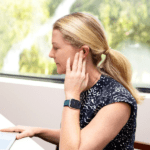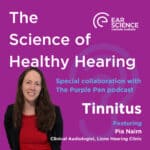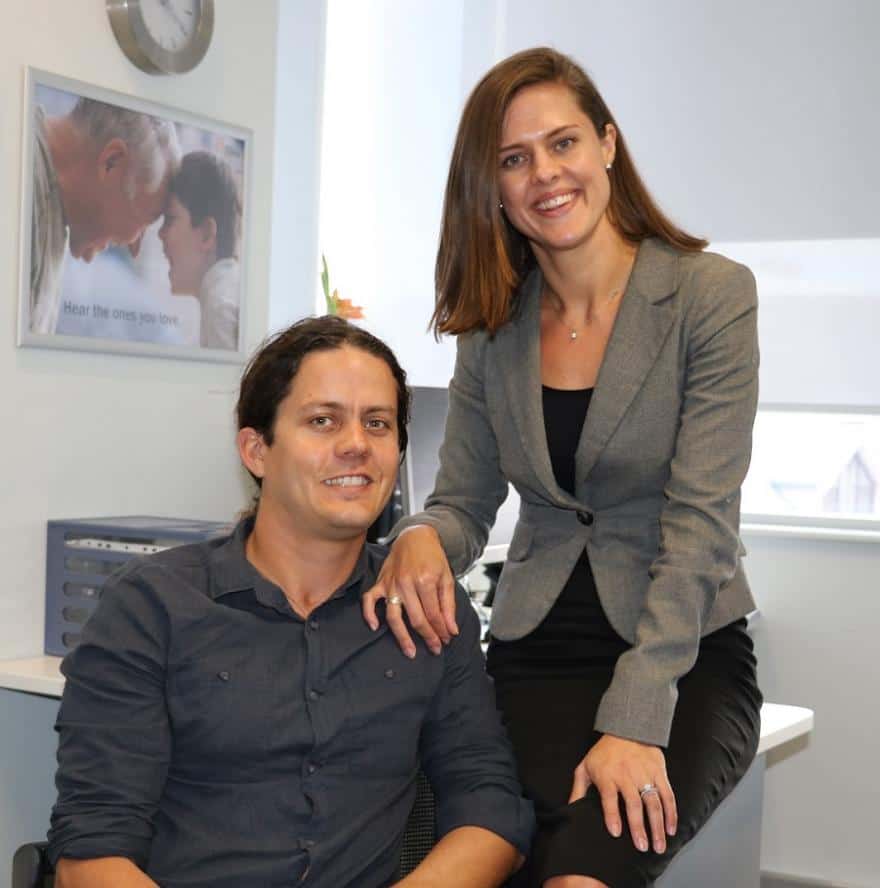In this episode, Qualified Audiologist & tinnitus specialist Sasha Benatar helps us understand this common condition.
What it is, what causes it and how can it be treated?
Dan van der Meer: [0:03] This is the Ear Science Podcast, The Science of Healthy Hearing.
Lize Coetzee: [0:09] Hello and welcome to the Ear Science Podcast, The science of Healthy Hearing. Proudly presented by Ear Science Institute Australia and not for profit medical research institute. In this podcast, we’ll bring you into our world, the world of Ear and Hearing Science. Together with Sasha Benatar, we’ll discuss the latest in ear and hearing research and what it means to you.
Dan: [0:33] I’m Dan van der Meer. I’m a digital content specialist, and podcast host, and I’m passionate about raising awareness for the impact of hearing loss.
Lize: [0:40] And I’m Lize Coetzee. I’m a qualified audiologist and the Chief Operating Officer at Ear Science Institute Australia.
Dan: [0:48] This podcast provides information of a general nature and does not constitute medical advice. And on today’s edition, we’re speaking with Sasha Benatar. Sasha, thank you for joining us on the Ear Science Podcast, The science of Healthy Hearing.
Sasha Benatar: [0:59] Hi, Dan, thank you so much. Hi, Lize. I’m very honoured to be talking to you about an area I’m very passionate about – and that is tinnitus.
Dan: [1:05] Awesome.
Lize: [1:07] Thank you, Sasha. Okay, so today we’re covering a really hot topic. Something that a lot of clients at Lions Clinic is interested in. Tinnitus is something almost all of us have experienced one time in our lives. Sasha Benatar is one of our qualified audiologists who specialises in the treatment of tinnitus. Sasha, can you tell us a little bit more about tinnitus? What is it and how common is it?
Sasha: [1:34] So tinnitus is really referred to or defined as the conscious awareness of a sound source in the absence of an external sound. So, one really starts to hear a variety of different sounds, there’s no two individuals that will experience tinnitus the same, but it’s commonly referred to or described as a ringing, a buzzing, a whooshing type sound that may be heard in the ears or the head, and can be continuous or intermittent. And like you said, Lize, we want to know more about how common it is in our everyday lives. And the latest findings are showing that two in every three Australians will experience tinnitus at some point in their lives, with one in five having severe tinnitus affecting their quality of life.
Dan: [2:27] Is it curable?
Sasha: [2:29] So, what we know at the moment, Dan, is whilst there’s no single identifiable cure for tinnitus, this really comes down to the heterogenic nature of tinnitus. It differs so greatly between two individuals. But we do know that there are certainly management approaches that can really help minimise the impact it’s having on one’s quality of life.
Dan: [2:55] Yeah, right. Okay. So, we hear this ringing or buzzing in our ears; what’s creating that sound?
Sasha: [3:02] So, just like with many things, tinnitus is not a disease itself but rather a response or a symptom of an underlying condition. So, it really comes down to what might be triggering the tinnitus, and they are well-recognised triggers, but the most common recognised trigger is hearing loss. So, a hearing loss of varying degrees may have an impact on one’s ability to access environmental stimuli. And our brains are really quite dependent on having that environmental enrichment around us. So, hearing loss as a trigger for tinnitus or a cause for tinnitus, it’s really the brain missing out on that stimulation and searching for it, creating awareness to its own neuro activity. Then we’ve also got another well-recognised cause, would be emotional stress. [4:10] And in 2021, Stegman and Collis actually identified that people who experience distress to their emotional well being relating to anxiety, stress, depression are significantly at greater risk for developing tinnitus. And it really comes down to the way the emotional brain, the limbic system, the way that is increased in activity. That has an effect on our internal filtering mechanism. Now this filtering mechanism is really responsible for analysing incoming sounds and determining which sounds we act on and which sounds pass through to our conscious awareness, versus which sounds we can comfortably ignore and filter out as a background information. So, when there is stress, there too is a change. This change has an effect on these filtering mechanisms. And those sounds that previously were deemed unimportant are now latched on to as tinnitus.
Lize: [5:18] You often, you know, as an audiologist and you would speak to a client, and they’d come in for their tinnitus, and we do a hearing test, but when you do that history and you really delving into, you know, when did it start? What were those triggers? Even if they don’t know, sort of, there’s always that point where they can go, “Yeah that happened to me.” You know, and then we can link that sort of emotional impact for them, and then their tinnitus study.
Dan: [5:46] Yeah. Okay. And for somebody, I mean, I don’t think I’ve got tinnitus. I haven’t had the test, but I’m pretty sure I haven’t. But for someone like me to understand that it is like, a night after a loud concert, or, you know, like in the movies, when there’s a massive explosion, you hear that high pitch, is that sort of a good?
Sasha: [6:02] So that’s a really good example of it. And I think that I really liked that example of a night after a loud concert. Because what that does is it actually causes a temporary threshold shift. So, it’s almost like a protective mechanism, there’s a temporary worsening of our hearing. And this is a really good example of how when our brain notices it’s not getting the same input that it used to, it starts to search for that sound. So as soon as then, in most cases with those loud concerts, loud nightclubs, when hearing returns to essentially its normal levels, then the tinnitus dissipates, and we don’t have that constant awareness to it.
Dan: [6:47] But tinnitus sufferers have that constantly, don’t they?
Sasha: [6:51] Constantly. And sometimes, it’s multifaceted. They have the presentation of ringing on top of the presentation of cicada type sound. There’s many buzzing different descriptions and the way you present it varies so greatly between individuals.
Lize: [7:11] So, tinnitus is something that most people will have experienced. And for many of us, it either goes away, or it’s not really bothersome, but for some people, it can really affect their daily life. Can you tell us what you have seen in the clinic with patients who are seeking help for tinnitus?
Sasha: [7:31] Sure. So basically, it’s important to almost differentiate that population of clients who have tinnitus but find it non-invasive from those who, like you said, come into our clinic. And really, it causes an impact on their quality of life. It’s really referred to as distressing tinnitus. For these individuals, tinnitus can cause a disruption to sleep, it can cause concentration difficulties. It even goes as far as to affect personal and interpersonal relationships between loved ones, colleagues, friends, we see it having an effect on mood and behaviour, leading to things like avoidance type behaviours. When people recognise okay it’s quiet, it’s worse, so I’m going to avoid that situation. And then it really starts to manifest in a variety of different ways because the client starts to almost create their own lived experience with the tinnitus and starts to react to that. So, it really does have an effect on a psychosocial level, economic level that affects your ability to perform and do activities and tasks that you used to.
Dan: [8:53] Yeah, it’s just amazing. I’ve got a classic story of that exact situation with a friend of mine who I play golf with at my local golf club, and we go on this golf trip every year. And last year, we all went on it, and we stayed in a shared house. And this year, he actually pulled out he said, I’m not going, and we all thought it was because someone had said something wrong. Turns out, he suffers from tinnitus and he couldn’t sleep at night because he was sharing a room. And he has to have white noise in the background to help him go to sleep. And once I found that out, and I told him about what you guys are doing here, I said, I didn’t know too much, but it is treatable. He honestly didn’t think there’s anything to do about it. So, but he literally pulled out of a social situation. We ended up convincing him to come, he ended up booking another chalet just around the corner. And he had a ball because he had his own room. He was too ashamed almost to admit that he had that problem. Whereas, and which is a very mild thing, I think too, but at the same time, he didn’t understand that it is treatable. So, I’ll send him your way.
Sasha: [9:53] Please do. I would love to meet with him.
Lize: [9:55] Yeah. I mean, Sasha we hear this, you know, all the time as an audiologist, it’s always so sad when a client comes in, and they believe nothing can be done about their tinnitus. They just need to live with it, you know. So, and this is, it’s not true, there is something that can be done. So, it’s so great that you said, you know, come in and see Sasha at Lions. What is currently the approach to tinnitus management, Sasha. So, you’ve said a few times the management of tinnitus. So, can you let us know a little bit more about that?
Sasha: [10:29] Definitely. So basically, how we approach management, it’s, firstly, there’s no two individuals that we would treat the same, basically, because it differs so greatly. But what we do is with all our approaches, it does follow an evidence based clinical care. And that’s something we really pride ourselves upon here at the Ear Science Institute and Lions Hearing Clinic.
We find that having that time with the client to really explore their tinnitus, in terms of ability to localise tinnitus, the types of sound they’re experiencing, gives us a bit of an idea of what approach is suited and best tailored to meet their needs. But we’re trying to promote a concept called habituation. And habituation, put simply is basically the brain’s ability to ignore a repetitive stimulus. And each and every one of us listening today has experienced habituation in our lives.
So, Lize, when you got up this morning and you put your watch on your wrist, your skin receptors are still sending that signal through to your brain, but because you’re not having a negative response to it, you don’t feel it until now I pointed out. So, because that’s that filtering mechanism we were talking about earlier. So, because it’s a comfortable, because it’s familiar, and it’s not deemed dangerous, the brain is comfortably ignoring that sound, or that stimuli. And what we are trying to do is take that approach with tinnitus management. And that’s the thing, it’s about retraining the brain to learn to reclassify that signal. Because ultimately, those signals have always been there. In the past, we weren’t attending to them. Whereas now the individual is attending to them. How we go about promoting habituation comes down to a combined approach between educational counselling. The more the client understands about the tinnitus, the more they regain control over tinnitus, and knowledge is power, and especially in the area of tinnitus.
That’s then mixed with sound enrichment. And this is a classic example. So where clinically required, we will strongly recommend hearing aids because we have seen the outcomes that that has on minimising the impact and reducing one’s awareness. But true through basic sound generators, and enriching the environment with sound like your friend, for example, having that noise generator at night time, it basically is his way of reducing the contrast between the tinnitus and the silence. And it’s easier to promote habituation to something that’s heard at a lower level, compared to when it’s as loud and as stark as it would be naturally.
Dan: [13:48] Yes, yeah. Yeah. Right. Okay. Fantastic.
Lize: [13:50] And Sasha, the research that Susan Tegg-Quinn did at the institute, you know, that actually showed that this assessment and counselling and the strategies that you give are so important, it’s such a key part of the tinnitus management and it really does help and that’s with children as well.
Sasha: [14:10] Yes. And what we’re noticing in that area is, we’re seeing a shift between almost occupational related hearing loss and therefore tinnitus to recreational induced hearing loss and tinnitus. And that’s why the prevalence of tinnitus is increasing amongst our childhood and adolescent populations because of that. There’s music going, there’s headphones, there’s gaming devices.
We’re living in a noisy world and that’s exactly, and Susan Tegg-Quinn research with her colleagues really highlighted that there is a significant increase in children and adults who developed tinnitus with hearing loss, compared to those with normal hearing. So that’s another classic example of why we look at hearing loss as one of the major triggers for tinnitus.
Lize: [15:15] And that research, because it’s such an amazing research, it actually showed that for children and adolescents that have tinnitus, it goes beyond just the perception of sound, but the impact it has on children’s well being, their academic performance, their social relationships, and their cognitive processing. So it sort of goes beyond just that sound. It’s so profound with kids, is really big. It’s really important for us not to ignore and just talking about adult with tinnitus, but it’s with kids as well.
Dan: [15:52] Kids as well. Well, actually, that’s interesting, because my three kids that in 12 and nine, all on devices with in earbuds, what can I do, as one example with those behaviours, to mitigate any risk of tinnitus in them?
Sasha: [16:10] Sure, Dan. And I think that’s really, you want your children to be able to enjoy themselves. And if this is a hobby that they really find pleasure in, you don’t want to take that away from them. Essentially, there are definitely some steps you can take and those involve things like you mentioned, they use in the ear devices.
So if we can try and encourage you to implement more over the ear headphones, specifically noise-cancelling headphones, we can then ensure they’re playing at a lower level, because it’s not competing with the extraneous environmental noise. As a parent or as a loved one, if you’re standing next to your children, and you can hear it, that’s a key indicator, it’s a bit loud. It’s probably too loud, it doesn’t solely come down though to the volume we’re also looking at the duration of exposure as well, the hair cells, which is the most the most common form of hearing loss is a sensory neural hearing loss, and this is a more permanent hearing loss where we see damage to the delicate little hair cells in the cochlea called cilia. So prolonged exposure and volume is something that, unfortunately, has an effect.
So there’s really three main strategies. If they can turn it down, if you can educate them, just get them to understand that they’re having the best time now but they do need their ears later on. If we can really look at involving them more in over the ear type headphones, that type of thing, it’s going to have a huge effect. And I think it’s really important that we do encourage an understanding for parents that it’s so great that in occupational health and safety now we’ve got this increased awareness about potential damage and excessive noise exposure to the cilia. But we really want to encourage children’s understandings that shift to recreational exposure and hearing loss is occurring.
Dan: [18:35] And is a massive risk.
Sasha: [18:36] Yeah, exactly.
Lize: [18:38] I think people are sort of, when you’re talking about noise exposure when it’s sort of a workplace and it’s loud jackhammer or something like that, that will cause damage, but if it’s music I love surely my ears will know that I love that. And your ears don’t discriminate, it’s volume and time, that’s the only two things.
Dan: [18:56] Well, and I think it’s a generational thing too. Back in my day, I listened to that music but was always on a speaker and wasn’t right up next to it; I was probably three or four meters away from it. Whereas these kids, it’s just everywhere, in their ears, and they do their job, I guess, but I guess it’s such a concentrated area now with exposing to the ear.
Sasha: [19:16] Exactly. And because it doesn’t attenuate as much they try to pump that volume up. So it’s just little steps like that, little measures, that can really have a great effect.
Dan: [19:29] So Sasha, this is all great. So back to my friend, the guy that suffers from tinnitus. So I’m going to tell him to come and see you. What actually happens? How do you assess someone’s tinnitus?
Sasha: [19:43] Sure. So, Dan, what will happen is to begin your friend will complete the well-recognised tinnitus questionnaire known as the Tinnitus Functional Index. This, together with a case history that we’ve put together hear in Lions Hearing Clinic approach, we’ve put together questions that give the audiologist an understanding about your friend’s tinnitus before he’s even stepped into the room.
We’re really starting to get an idea and delve into his experience; then, he will attend on the day of the consultation. And during the appointment, it will begin with a very, very thorough case history. We want to learn about the characteristics of his tinnitus; we want to know what is he identifying that makes it worse? What is he identifying that could help make it better? Really trying to get a better understanding of his experience with tinnitus, we will then put him through a series of audiological assessments. And really what this is, is a comprehensive hearing test, as well as additional measures which I’ll explain to you. But the reason we encourage this hearing assessment is because it is such an integral part of what could be contributing to this person’s tinnitus. It may be that he has a simple loss in just a few pitches, one that he’s not perceiving on a daily basis, but that’s enough to be the reason or the cause for his tinnitus to begin with. So he’ll complete that assessment as well as test that for outside of a standard hearing assessment. We test higher frequency sounds as well, higher pitches.
And we also do like to validate the clients experience with the tinnitus, we want to get an idea what frequency is their tinnitus, within? What range are they experiencing? And also the volume of their tinnitus. And this gives us a bit of an idea of how once we’re monitoring their progress, can we refer to that and see has there been any changes in that area? Once we have those findings, cross-checking that really with their detailed case history. We will then work through this in a really comfortable environment, we have the discussion of the findings, we look at what are key standouts for their experience. What are the findings say now?
What can we do specifically for your friend’s needs? That’ll help manage the tinnitus and really begin to promote that concept of habituation. So we’ve got that signal. Now that he has a better understanding of what’s contributing to it, what are the steps that we’re going to take to reduce his awareness of it? And in most cases, it’s not a once-off appointment, we recognise tinnitus is a really big experience. You’ve been living with it for months, years. It doesn’t take a simple appointment. In some cases, we may need to fit you with hearing devices, we’d like to monitor your rehabilitation journey, we see you two or three times in the first month and then if not six months, on an annual basis. We really support you every step of the way.
Dan: [23:24] And due to the nature of the base, it really is a tailor-made case by case assessment of where this person could be with the tinnitus.
Sasha: [23:34] Exactly, there’s no one size fits all approach to how we go about it, but we use that almost as a framework because this is what the evidence tells us and this is how we get the best outcomes taking this approach.
Dan: [23:47] Fantastic.
Lize: [23:49] It’s so good to hear you speak about how each person journey is individualised for them because tinnitus can feel a little bit isolating. What are they going to do? Mine is different; my causes are different, I’m experiencing it differently, that you understand that and that our protocol allows for that. That’s really fantastic.
Sasha: [24:10] We also recognise, Lize, that they’ve been told by people they have so much trust in, sometimes even their GPS, that there’s nothing that can be done you just have to live with it. That is why we are here. We are here to bridge that gap between that misunderstanding or that there’s no cure and the strategies we need to put in place to begin the rehabilitation journey, and like you said, it’s such an individualised experience.
Lize: [24:45] That gives them hope.
Sasha: [24:46] Yeah, and that’s power too.
Dan: [24:47] Education is power, with my kids.
Lize: [24:52] Sasha earlier mentioned Susan Tegg-Quinn research, she’s been doing at ear science and it showed the effectiveness of the counselling, the assessment, the strategies that is provided in the clinical protocol. Can you tell us a little bit more about the outcomes that you are seeing with people that do take this journey, and has the assessment and goes through this whole process?
Sasha: [25:17] With pleasure. So I’ll speak from my perspective first. This is the most rewarding space to work in simply because we see the positive effects as audiologists and as Lions Hearing Clinic and ear science, the effects we have on one’s quality of life.
They come in at one point, and they leave at another. The turn of events is huge. And it’s not them in isolation, it’s their effect on their loved ones, their relationships, their performance in society with work, it’s just great, it’s very rewarding. I’ve personally had clients that have had outcomes that have been so positive that they too, are encouraging almost educating the community’s awareness about what can be done themselves, advocating for the fact that don’t listen to Dr. Google, there’s no cure. Let’s see what they can do for you.
And often enough, it’s actually not tinnitus alone that they find improves, it’s their hearing ability In general. Sometimes the deterioration is so gradual, that it’s so hard for the client to know what they missing out on until they have something to compare with. So they really find that there’s positive outcome in many aspects of their life. And it’s really wonderful to see them transition through this journey, through improved concentration ability, improved communication, improved just personal relationships. They really do have good outcomes.
I have many clients that I wish I could introduce to you to advocate for it. Maybe we will one day, because I’m sure they’d be very proud to share their stories. But I really do believe that there’s no better area than communication, hearing loss and tinnitus to work in. We are so instrumental in healthy ageing, and we do firsthand get to experience that ourselves get to witness the impact these just these few strategies can have on one’s quality of life.
Lize: [27:58] Okay, and Sasha, what is the future hold for tinnitus?
Sasha: [28:01] Working at Ear Science, as a clinician, as an audiologist, we are so fortunate that we get to work so closely with researchers in the space and field, and we get to implement the current management approach have an effect today, but research from our even our hearing therapeutics team they are looking at using stem cells to almost regenerate the outer and inner hair cells of the cochlea, the cilia that I was referring to.
So it’s so wonderful that we can work so closely alongside the research and then translate this into practice. We won’t stop there. It won’t just be we have these management approaches, this is it. We will continue to strive for a cure. But in the meantime, this is going to have an effect.
Dan: [28:56] So if you are suffering, don’t delay.
Sasha: [28:59] Seek help today. You must tell your friends.
Dan: [29:07] So for anyone, this has been a fantastic session. Thank you so much. What are your key takeaways that you’d like someone listening, anyone with experiencing tinnitus or with family members who are experiencing tinnitus? What would you like them take away from listening to this episode?
Sasha: [29:21] So anyone listening or anyone who has a loved one that may relate to anything we’ve experienced today, no matter how small the impact, it all begins with picking up the phone, calling our tinnitus and hearing advice Line, calling our customer liaison center, that’s the step you need to take.
Their experience and knowledge, guide you through the steps to follow and implementing just this one thing can have such a great impact overall.
Don’t delay it. It’s never too late but don’t delay it.
We have the options, we have the tools, let us help you. And let us work closely. You’ll be helping us for the future and we’ll be helping you in the present.
Dan: [30:10] Well, Sasha, It’s been an absolute pleasure to have you join us today. It’s wonderful to know that lots of people who are experiencing tinnitus could get support, to help them live a healthy connected life. It’s also reassuring that your treatments are based on a lot of research and science, and your face lights up every time you talk about it. So you’re clearly passionate about helping people, and that’s lovely to say so. Thank you so much Sasha for joining us on the podcast.
Sasha: [30:31] Thank you so much for having me and I hope that anyone listening can take something away from today and all the messages from the podcast.
Lize: [30:43] Thank you so much Sasha.
Dan: [30:46] Audiologists are trying to evaluate your tinnitus symptoms through a comprehensive audiological assessment and subject measurement. That will develop a personalised management program that is specific to your circumstances helping to reduce the harmful effects tinnitus has on your quality of life.
There’s no single identifiable cause of tinnitus, however, hearing loss of any degree is most recognised cause of tinnitus. Whereas there is no cure for tinnitus, there are management and treatment options. Start your hearing journey with a hearing assessment at Lions Hearing Clinic to determine the best path right for you. We are here to support you with your hearing needs to keep you connected with your family, friends and community.
Please call our hearing and tinnitus advice line and discuss your hearing needs 1800 054 667. If you’ve enjoyed this episode let us know about it by writing and reviewing this podcast or sharing with a friend or family member.
Make sure you subscribe so you don’t miss an episode. Next episode we will learn about incredible research which is uncovering the incredible link between untreated hearing loss and dementia and learn why treating hearing loss might reduce the risk of developing dementia later in life.
Dona: [31:55] The work we have done at the Ear Science Institute of Australia has found that untreated hearing loss is associated with increased risk of depression, anxiety and stress and also when someone has a hearing problem they avoid social situations, the won’t go out with their friends, they won’t pick up the phone.
So even if they are surrounded by a lot of loving and caring family members and friends, the inability to communicate effectively makes them feel lonely and isolated. So together all these factors increase the risk of cognitive impairment and dementia.
Dan: [32:27] To view this episode with captions, visit the Ear Science YouTube channel or our website www.earscience.org.au/podcasts.
To suggest a topic for a future episode, links to more information and research papers on this topic visit our website www.earscience.org.au/podcast.
The producer of the Ear Science Podcast, the science of healthy hearing, is Emma Ireland with sound engineering and editing by myself Daniel Dan van der Meer.
We acknowledge the original custodians of the land we are producing this podcast on, the Whadjuk people of the Noongar Nation and the land on which you’re listening from. We pay respect to the Noongar elders past, present and emerging.






